

Logical Fallacies Handlist. Logical Fallacies Handlist: Fallacies are statements that might sound reasonable or superficially true but are actually flawed or dishonest.

When readers detect them, these logical fallacies backfire by making the audience think the writer is (a) unintelligent or (b) deceptive. It is important to avoid them in your own arguments, and it is also important to be able to spot them in others' arguments so a false line of reasoning won't fool you. Think of this as intellectual kung-fu: the vital art of self-defense in a debate. For extra impact, learn both the Latin terms and the English equivalents. You can click here to download a PDF version of this material.In general, one useful way to organize fallacies is by category. . (2) Circumstantial: To argue that an opponent should accept or reject an argument because of circumstances in his or her life.
Falsifiability. From Wikipedia, the free encyclopedia.

This page discusses how a theory or assertion is "falsifiable" ("disprovable" opp: "verifiable"), rather than the non-philosophical use of "falsification", meaning "counterfeiting. " The idea comes from the work of the philosophers Sir Karl Popper and Ernest Gellner. Falsifiability is an important concept in the philosophy of science that amounts to the apparently paradoxical idea that a proposition or theory cannot be scientific if it does not admit consideration of the possibility of its being false. "Falsifiable" does not mean "false".
For a proposition to be falsifiable, it must be possible in principle to make an observation that would show the proposition to be false, even if that observation has not been made. Psychogenetic Fallacy. The Psychogenetic Fallacy occurs when an attempt is made to psychoanalyze a person who holds a certain view and this psychoanalysis is used as a reason that the person’s view is not correct.
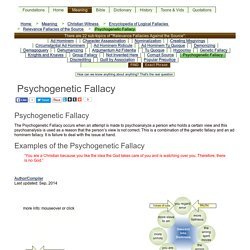
This is a combination of the genetic fallacy and an ad hominem fallacy. It is failure to deal with the issue at hand. There is so much more for you. This is what you have been missing. Don't let anyone deceptively keep you from fulfilling your destiny and God's purpose for your life. God has established the pattern of Scripture, for life and for the Church. You can feel free to use the Contact Form further down on this page to ask any question regarding this pattern of Scripture. End. Dialetheism. 1.

Some Basic Concepts Though dialetheism is not a new view, the word itself is. It was coined by Graham Priest and Richard Routley (later Sylvan) in 1981 (see Priest, Routley and Norman, 1989, p. xx). The inspiration for the name was a passage in Wittgenstein's Remarks on the Foundations of Mathematics, where he describes the Liar sentence (‘This sentence is not true’) as a Janus-headed figure facing both truth and falsity (1978, IV.59). Fallacies. A fallacy is a kind of error in reasoning.
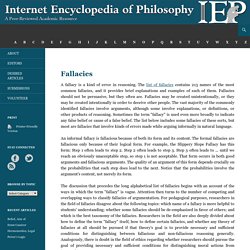
The list of fallacies contains 213 names of the most common fallacies, and it provides brief explanations and examples of each of them. Fallacies should not be persuasive, but they often are. Fallacies may be created unintentionally, or they may be created intentionally in order to deceive other people. A List Of Fallacious Arguments. Attacking the person instead of attacking his argument.
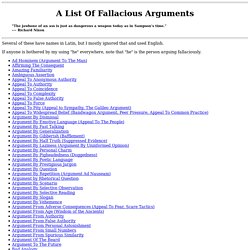
For example, "Von Daniken's books about ancient astronauts are worthless because he is a convicted forger and embezzler. " (Which is true, but that's not why they're worthless.) Another example is this syllogism, which alludes to Alan Turing's homosexuality: Turing thinks machines think.
Turing lies with men. (Note the equivocation in the use of the word "lies".) T. Edward Damer, Attacking Faulty Reasoning: A Practical Guide to Fallacy-Free Arguments. LogicalFallacies. A List Of Fallacious Arguments. Attacking the person instead of attacking his argument.
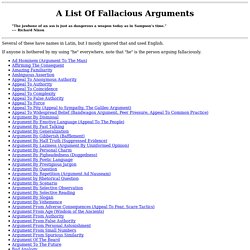
For example, "Von Daniken's books about ancient astronauts are worthless because he is a convicted forger and embezzler. " (Which is true, but that's not why they're worthless.) Another example is this syllogism, which alludes to Alan Turing's homosexuality: Turing thinks machines think. Turing lies with men. (Note the equivocation in the use of the word "lies".) Logic - By Branch / Doctrine. Introduction | History of Logic | Types of Logic | Deductive Logic | Inductive Logic | Modal Logic | Propositional Logic | Predicate Logic | Fallacies | Paradoxes | Major Doctrines Logic (from the Greek "logos", which has a variety of meanings including word, thought, idea, argument, account, reason or principle) is the study of reasoning, or the study of the principles and criteria of valid inference and demonstration.
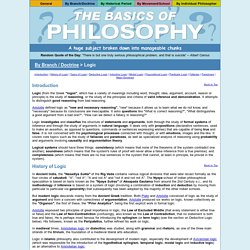
It attempts to distinguish good reasoning from bad reasoning. Aristotle defined logic as "new and necessary reasoning", "new" because it allows us to learn what we do not know, and "necessary" because its conclusions are inescapable. Your logical fallacy is the fallacy fallacy. Absolute Truth. "Truth" is defined as: "the real state of things; fact; reality; an accepted statement or proposition.

" Some suggest that there is no true reality, only perceptions and opinions, while others argue that there must be some absolute basis. This being said, we can say that there are two diametrically-opposed beliefs related to absolute truth: Either: 1. There are no absolutes that define reality. Propositions, arguments and truth. Propositions One of the fundamental concerns in philosophy is that with truth.
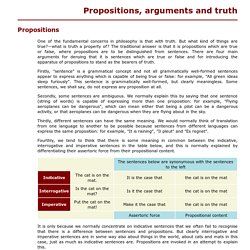
Logic Self-Taught: A Workbook (by Dr.P.) Logic Self-Taught: A Workbook © Katarzyna Paprzycka (dr.p) [Katazhyna Papzhytska] propositional logic, predicate logic, Katarzyna Paprzycka, Dr.P., propositional logic, Logic Self-Taught: A Workbook, sentential logic, quantifier logic, logic for dummies, logic for everybody, logic for people, logic for students, logic textbook on-line, logic textbook for WebCT, logic textbook for Blackboard, logic textbook for e-learning, natural deduction, teaching logic, logic for high-school students, logic for non-logicians, logic for lawyers, logic for philosophers, teaching to do proofs, Bergmann, Moor, Nelson, The Logic Book, Solutions to logic exercises, logic help.
Logical Fallacies Handlist. Logical Fallacies Handlist: Fallacies are statements that might sound reasonable or superficially true but are actually flawed or dishonest. When readers detect them, these logical fallacies backfire by making the audience think the writer is (a) unintelligent or (b) deceptive. It is important to avoid them in your own arguments, and it is also important to be able to spot them in others' arguments so a false line of reasoning won't fool you. Think of this as intellectual kung-fu: the vital art of self-defense in a debate. For extra impact, learn both the Latin terms and the English equivalents. You can click here to download a PDF version of this material.In general, one useful way to organize fallacies is by category.
. (2) Circumstantial: To argue that an opponent should accept or reject an argument because of circumstances in his or her life. . (1) Bandwagon Approach: “Everybody is doing it. . ” (2) Patriotic Approach: "Draping oneself in the flag. " Logical Fallacies Handlist. Fallacies. A fallacy is a kind of error in reasoning. The list of fallacies contains 209 names of the most common fallacies, and it provides brief explanations and examples of each of them. Fallacies should not be persuasive, but they often are.
Fallacies may be created unintentionally, or they may be created intentionally in order to deceive other people. The vast majority of the commonly identified fallacies involve arguments, although some involve explanations, or definitions, or other products of reasoning. Sometimes the term "fallacy" is used even more broadly to indicate any false belief or cause of a false belief. An informal fallacy is fallacious because of both its form and its content. The discussion that precedes the long alphabetical list of fallacies begins with an account of the ways in which the term "fallacy" is vague. Table of Contents 1. The more frequent the error within public discussion and debate the more likely it is to have a name. AbsoluteTruth.Net: Absolute Truth.
Propositions, arguments and truth. Neuroscience, Moral Psychology, and the Homunculus Fallacy by Don Collins Reed. I was taught as a boy that vision involves an image entering my head through my eyes. As the image is conducted through the lenses, it is flipped upside down and projected stereoscopically onto the back of my head. My brain then has to re-flip the image and interpret it. Putting the matter this way, however, assumes the presence of a little man inside my head who sees the image projected as if onto a screen – who would in turn have to have a little man inside his head, and so on ad infinitum. This is called the “homunculus [or ‘little man’] fallacy.” Neuroscientists scoff at such a lack of sophistication.
On the other hand, we sometimes hear neuroscientists say things like the following: “Just as the CEO of a corporation delegates different tasks to different people occupying different offices, your brain parcels out different jobs to different regions” (V.S. With the homunculus fallacy in mind, please answer Question #1: An easy way to learn the logical fallacies. Published each day, Monday-Friday.The Fallacy-a-Day Podcast. Untitled. Introduction to Logic. Logical Fallacies. Logical Fallacies Logic is the study of reasoning -- the nature of good (correct) reasoning and of bad (incorrect) reasoning. Its focus is the method by which an argument unfolds, not whether any arbitrary statement is true or accurate. Thus, an argument can be both deductively valid and perfectly absurd, as in 1. All telephone poles are elephants. 2.